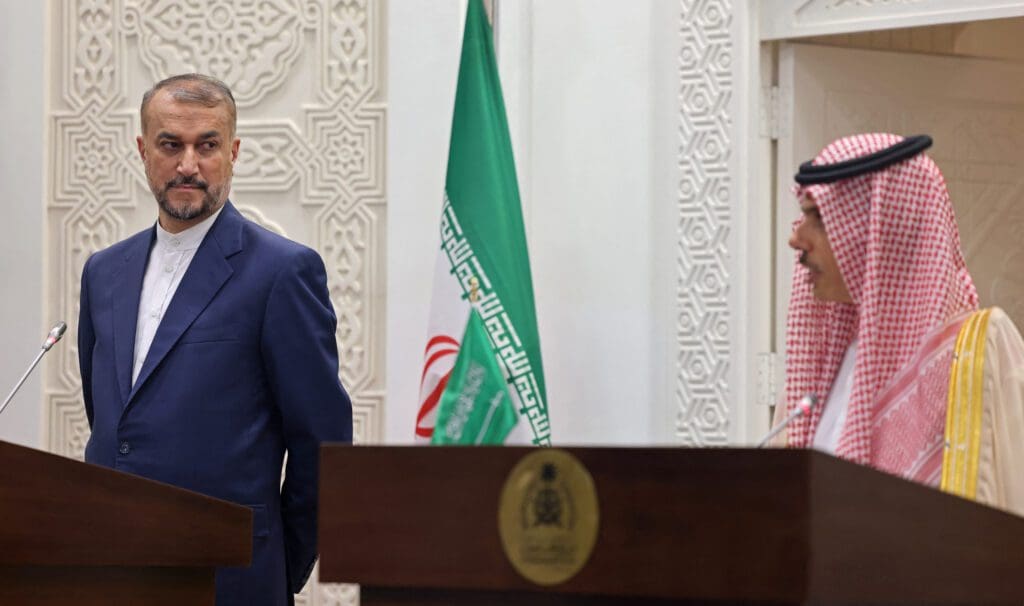March 10 marks a year since Saudi Arabia and Iran announced they were mending ties and resuming diplomatic relations, a landmark deal between the regional foes after mediation by China. Since their joint statement in Beijing, the two have forged solid connections, interacting regularly at the ministerial level. However, both sides need to invest more effort into deepening their bilateral relations, for their own interests and for those of the region—especially given the turmoil that has befallen it since.
The significance of Saudi-Iranian Reconciliation for the Region
The significance of the Saudi-Iranian reconciliation deal is difficult to overstate, impacting the Middle East in several key ways. Firstly, it has de-escalated the tension between the two major conflicting parties in the region. For years, Riyadh and Tehran had engaged in a fierce competition for geopolitical influence, with fronts in Lebanon and Syria, Iraq, Bahrain, and Yemen. Their normalization of relations has halted and even reversed the trend of tense competition across the whole region.
Secondly, their Saudi-Iranian reconciliation has served to maintain a modest form of stability. The events of October 7 and the subsequent war in Gaza have served as a reminder that stability in this neighborhood is always fragile. The desperation of Palestinians resulting from Israel’s long-term occupation, and Israel’s disproportionate retaliation, have plunged the region into yet another disaster. But given the potential for spillover from the Palestine-Israel conflict, the reconciliation between Saudi and Iran has served as a vital anchor for a bare minimum of regional stability.
Thirdly, the reconciliation serves to promote the legitimate cause of the Palestinians. Saudi Arabia and Iran are not just powerful in the Gulf but also across the region and the Muslim world. The unity of the two as a result of reconciliation gives strength to the Muslim world in the fight for the Palestinian cause, which affects the peace and stability of the whole region.
Enhancing Saudi-Iranian Reconciliation
Over the past year, both sides have demonstrated a willingness to push their reconciliation forward. Shortly after the joint statement announcing the rapprochement, the two resumed diplomatic relations and re-established an embassy in the capital of the other, per the agreed schedule. In November, Iran’s President Ibrahim Raisi visited Saudi Arabia and attended an extraordinary joint Islamic-Arab summit in Riyadh regarding the situation in Gaza. In early February, Iran announced a visa-free travel policy for nationals of the United Arab Emirates, Saudi Arabia, Bahrain, Kuwait, and Qatar (citizens of Oman, the other Gulf Cooperation Council member, already enjoyed this right).
Also of note is that the two have shown a strong interest in security dialogue. On November 30, 2023, Major General Mohammad Hossein Bagheri, the chief of staff of the Iranian Armed Forces, spoke by telephone with Khalid bin Salman Al Saud, the Saudi minister of defense. The two announced they were ready to promote bilateral military ties, reflecting willingness on both sides for more intensive engagement.
For a region prone to instability, the significance of this reconciliation cannot be over-emphasized. Yet to further reduce uncertainty, these efforts must be sustained. While China has many reasons to mediate and will always be ready to invest in efforts to promote Saudi-Iran reconciliation in the region, the two sides could work bilaterally to deepen it themselves, in several ways.
How can Saudi-Iranian relations be strengthened?
Firstly, they could work together to arrange more high-level interactions. Such visits would serve to improve political relations, as well as enhance mutual trust and lay out a framework for future cooperation. Raisi has already visited Saudi Arabia; the two sides could now organize a reciprocal visit from the Saudi side. These moves build confidence and could add fresh momentum to the reconciliation process. High-level exchanges on the Palestine question, in particular, could add new impetus to the relationship.
Secondly, the two countries could hold regular security dialogues across the Gulf. The uncertainties resulting from the Palestinian-Israel conflict and the turbulent situation in the region, in general, necessitate a timely exchange of views so as to avoid misunderstandings. The goodwill expressed by the two military chiefs in November 2023 suggested that such exchanges are desirable—so why not make them regular? For instance, top brass could sit at the table every two or three months for discussions on all their issues of concern. If nothing else, these exchanges could serve to enhance mutual trust.
Thirdly, Tehran and Riyadh could work together to boost their economic cooperation. Economic benefits would serve to enhance and give momentum to their reconciliation politically. It is true that Western sanctions against Iran might stand in the way of economic cooperation. But for instance, Saudi Arabia and the other GCC countries could each try to invest in just one project in Iran, which should serve to encourage Iran to deepen the reconciliation too. Despite the sanctions, businesspeople would likely find ways to implement such projects.
Fourthly, the two sides could conduct more academic exchanges. There have already been a lot of exchanges between scholars from Iran, Saudi Arabia, and other major GCC countries in venues provided by third parties, even when their countries’ relations were antagonistic. But for a solid reconciliation, the two sides could encourage more such exchanges. Academic institutions in both Saudi Arabia and Iran could invite scholars from the other side to be visiting fellows, or simply to attend more academic conferences. The financially better-off institutions in the GCC countries could offer more such programs for Iranian scholars. Direct exchanges of think tank experts would certainly greatly reduce misperceptions among policy-makers on both sides.
All in all, the significance of Saudi-Iran reconciliation should not be underestimated. Differences will remain, but ultimately the two countries are neighbors. For a better future for them and for the stability of the region, both will have to find ways to carry forward their reconciliation. There are plenty of ways in which to do so, providing the two sides are serious and continually communicate so that misperceptions and obstacles can be overcome.


